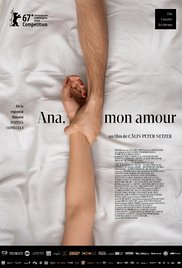
ANA, MON AMOUR
Romania, 2017, 136 minutes, Colour.
Mircea Postelnecu, Diana Cavallioti.
Directed by Calin Peter Netzer.
During the last decade or more, some excellent films have emerged from Romania, impressive in their stories and the treatment, winning many international awards. This film is in that tradition
In many ways it is a small story, though the running time of the film is well over two hours. It is presented in a complex manner, moving backwards and forwards in time, each segment throwing light on the other, reflection on the past, anticipation of the future. (A hint for those who might be finding it difficult to identify which time the characters are in, it is the hair of the principal actor, longer when he was younger, shorter when he is older, that is a useful key.)
The film opens with some serious discussion between a young woman, Anna, and a young man, Toma, reflections on the meaning of life and the philosophy of Friedrich Nietszche. The two are in love. In a linear explanation, it could be said that they are in love, she is unwell, he is protective, she becomes pregnant, gives birth; there is a sketch of the early years of their marriage.
However, very early in the piece, Toma, with short hair, is seen in a consultation with a psychologist – and the audience anticipates that there have been some difficulties, quite rightly. As the film goes back and forth, it is this session with the psychologist which comes at the end, Toma speaking of a dream, trying to interpret it, the meaning of his life and marriage, leaving the audience wondering about the possibilities…
The is well acted, Diana Cavillieti being quite persuasive as a vivacious young woman who does have some psychological problems, especially concerning her father-in-law, seen when the couple go to dinner at her parents’ house. She also has dizzy spells but tries to be self-reliant. Mircea Postelnecu is a genial young man, studious, always concerned about Ana, taking her to the hospital.
One of the themes of the film, seen as the screenplay goes backwards and forwards in time, is that as Ana builds the confidence and self-image, Toma becomes somewhat less confident, petulantly resigning from his job, staying at home to look after their son, his self-image getting lower.
Audiences will regret the tensions between the two because they have got to know them rather well and have sympathy for them.
The film is directed by Calin Peter Netzer, who won the Golden Bear at the banal A, 2013, with his film, Child’s Pose.
1. A contemporary story, Romanian, universal?
2. The title, the focus on Ana, the ‘my’ of Toma?
3. Romanian cities and towns, apartments, homes, the streets, universities, therapist’s offices, newspaper offices? The musical score?
4. The picture of the two, their love, the characters, going to visit the families of each, Ana and the role of her stepfather, the mother and traumas? Toma and his parents, the criticisms of his father? The support of his mother? The relationship between the two, the sexual relationship? Their company, intellectual talk, the opening about nature…?
5. The psychological shifts in the two characters over the years? To-ing and fro-ing in the themes and scenes? Identifying the time with Toma and his hair and haircut?
6. The religious background, the parents and their churchgoing, Toma going to the church, buying the candle, asking for the priest, finding him, the ritual of the confession, his bowing down, the stole over him? The priest, friendly, some commonsense, asking how long since the last confession, the small things first, the cigarettes and the costs over the years, enough to buy a car? Then the greater issues? The image of Thomas, doubtful but still believing? Toma and his explanations about his relationship with Ana, the medication, the priest thinking that talking
out issues is important,? Toma later saying that the priest smelt alcohol?
7. Toma, with the psychologist, early in the film, yet years later in time? The interview, trust, talk, dreams, characters and betrayals, dreams and interpretation? Future?
8. The time structure, moving backwards and forwards? The past throwing light on the future and the future on the past?
9. Ana, her health, her troubles, trauma? The medication? Therapy and talking? Her intelligence, love for Toma, wanting to be a teacher, he wanting to be a journalist? Her turns, becoming dizzy, his concern, taking her to hospital, the tests? The pregnancy, the options and her concern about the birth?
10. The birth of their son, Tudor, fostering him, tender, the years passing, his growing, the outings?
11. Ana getting stronger, becoming a journalist, her contacts, her success, the author and his phone contacts, Toma and his jealousy?
12. Toma, writing, erratic in character, mood swings, articles, the board meeting, the criticism, his resignation? Home, caring for Tudor?
13. Tensions, and the declaration of Ana, becoming stronger, and independence? Accusing him of being more paranoid, the phone calls, suspicions? Asking for a divorce?
14. The psychologist, the dream, at the front door, Toma and his discussions with the psychologist – and the future?